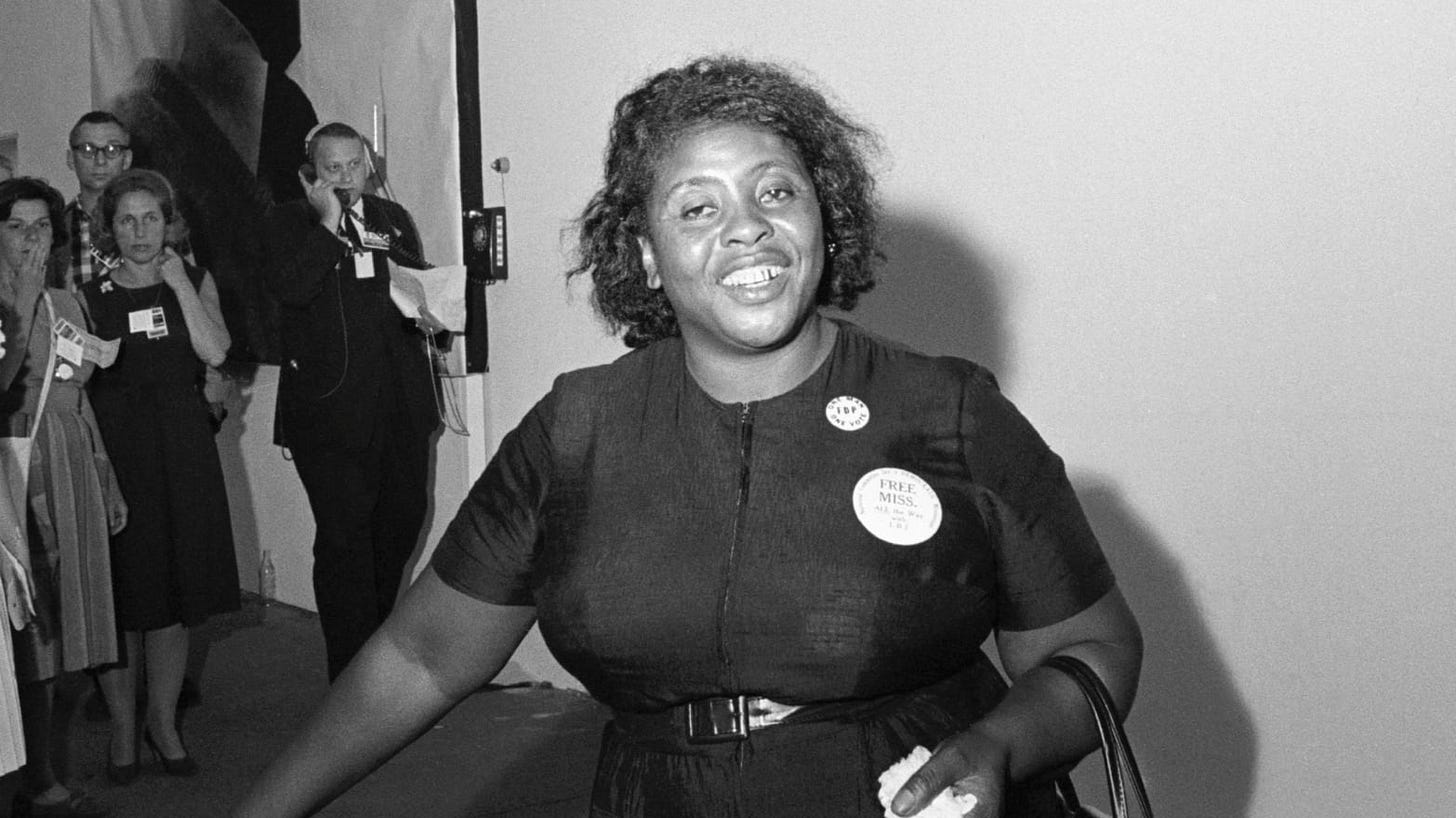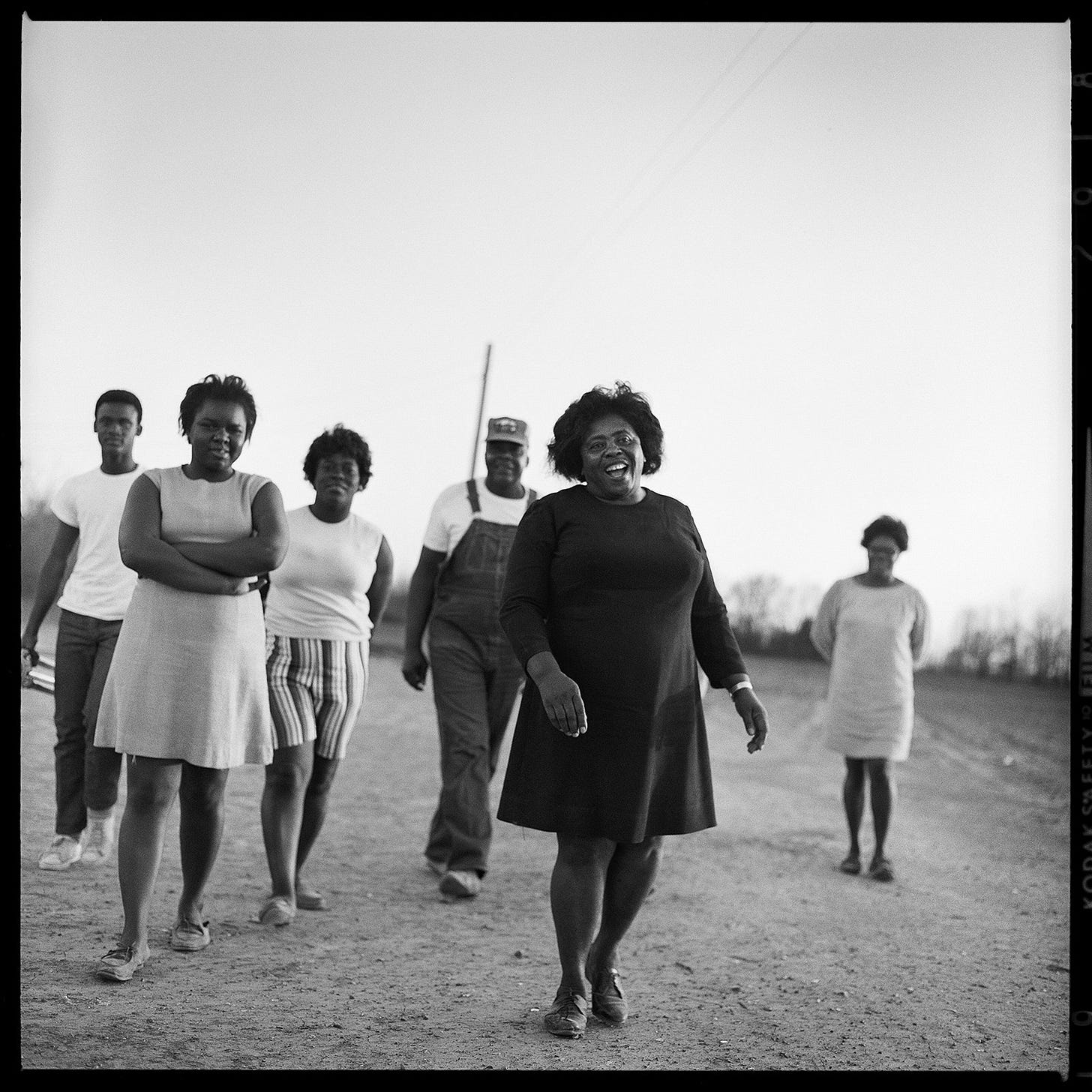When I liberate others, I liberate myself.
Advent Day 22: Fannie Lou Hamer (1917-1977)
By this point in Advent, it should be clear that mystics, contrary to stereotype, are not hermits hiding out on misty mountaintops. More often than not, they are just regular folks caught up in the struggles of everyday life—people whose God-rootedness gives them the hope, love, joy and peace, as well as the vision and courage, to live as prophetic witnesses. In the modern era, few have modeled the mystical prophetic vision with more vigor than Fannie Lou Hamer.
Fannie Lou was born in 1917, the youngest of twenty children in a Mississippi sharecropping family. As a child, she excelled at reading and spelling, and possessed a sharp recall that allowed her to memorize Bible stories, a talent she would later use to great effect. However, in sixth grade, she was forced to quit school in order to work and support her family. By age twelve she was picking up to 300 pounds of cotton a day, with no expectation that her life would ever look any different. As a poor Black girl in rural Mississippi, any other future was practically unimaginable.
Most mystics have a conversion story, that point where one takes (or is forced along) the first step of a journey toward an awakened life. Fannie Lou’s conversion occurred in 1961 when she had surgery for a benign tumor. While under anesthesia, the doctor took the liberty of removing her uterus (Fannie Lou coined the term Mississippi appendectomy to describe this forced sterilization which was legal at the time). This assault on her basic humanity, and the fact she had no legal recourse, infuriated Fannie Lou. Fired up, she went to the local courthouse to register to vote. Predictably, she was denied. Also predictably, when word got back to her boss about her attempt to register, she was immediately fired.
Soon, death threats from the KKK forced her and her family into hiding. But rather than being cowed into submission, Fannie Lou was galvanized to seek freedom in the budding Civil Rights movement. Later, she summed up the breaking point after which she was willing to risk life and limb in search of liberation:
I was sick and tired of being sick and tired.
At meetings of the Student Non-Violent Coordinating Committee (SNCC) and the Southern Christian Leadership Conference (SCLC), Fannie Lou quickly made a name for herself. She didn’t just speak about the fight to liberate the South from Jim Crow, she preached with truth and power, invoking Old Testament prophets, the good news of Jesus, and the Negro spirituals which she sang with full-throated conviction.
The effect mesmerized listeners, offering comfort and hope to those who’d suffered under segregation, and courage for those engaged in the battle for civil rights. Decades later, many still recalled her unshakeable peace at the eye of the political storm. Fannie Lou credited this peace, and the real joy and purpose she felt, to God. Liberation work was God’s work, God’s will. She was, she insisted, just an instrument chosen to heal the brokenhearted, preach deliverance to the captive, and restore sight to the blind.
By 1963, the former sharecropper was organizing voter registration drives as a field secretary for SNCC. In June of that year while returning by bus from an SCLC conference in South Carolina, she was arrested in Winona, Mississippi under trumped up charges of disturbing the peace. At the jailhouse, Fannie Lou was molested and suffered a near-fatal beating that left her with a permanent limp, kidney damage, and a clot behind her left eye. Within a month, however, she was back at work.
I guess if I'd had any sense, I'd have been a little scared—but what was the point of being scared? The only thing they could do was kill me, and it kinda seemed like they'd been trying to do that a little bit at a time since I could remember.
Through it all, Fannie Lou refused to hate, citing her Christian faith and lessons taught by her mother. Instead, she took the mystical stance. Seeing how segregation harmed the souls of the oppressors too, she prayed for the police who assaulted her, and blessed those segregationists who would deny her humanity. She wanted everyone to break their chains. In Fannie Lou’s cosmic vision, freedom was spirit work, and it was for the good of all.
Fannie Lou’s spiritual-political activism hit a peak on August 22, 1964 when she led an interracial delegation onto the floor of the Democratic National Convention in Atlantic City in protest of the all-White Mississippi delegation. In a speech watched by millions on the evening news, Fannie Lou laid out the hurdles and violence she’d faced while trying to exercise rights guaranteed her by the Constitution. Then she held a figurative mirror up to the country and demanded to know:
Is this America, land of the free and home of the brave?
Though Fannie Lou failed to be seated at the 1964 convention, she succeeded in making history. Never again would race be a disqualifying factor at a Democratic convention. Four years later, at the 1968 convention, Fannie Lou became the first woman from Mississippi and the first African-American since Reconstruction to be seated as a delegate.
Over the next decade, Fannie Lou kept up her relentless pace, lending her prodigious energy and prophetic voice to the fight against poverty, the women’s movement, and against the war in Vietnam. But the work took its toll. By the 1970s she was suffering from untreated diabetes, hypertension and, finally, breast cancer. Still, she kept on. When asked where she got her strength to keep fighting for the poor and marginalized, she credited her faith:
Christianity is being concerned about (others), not building a million-dollar church while people are starving right around the corner. Christ was a revolutionary person, out there where it was happening. That’s what God is all about, and that’s where I get my strength.
Fannie Lou Hamer died on March 14, 1977 at the age of fifty-nine.
Practice
Read Luke 1:46-55.
This ancient hymn—called the Magnificat—is sung by Mary when she visits her cousin Elizabeth after learning she will carry and give birth to an extraordinary child. In the hymn, Mary rejoices in her role of bringing Love into the world then she predicts a new dawn of justice for the oppressed.
Write down or meditate on a passage that brings you comfort. Then reread verses 51-53. As people who, by most global and historic measures, are wildly privileged does this section make you squirm? Write down or meditate on what makes you uncomfortable.
Now, consider this quote from Fannie Lou Hamer:
You can pray until you faint, but unless you try to get up and do something, God is not going to drop it in your lap.
Both Mary and Fannie Lou combined action with contemplation. Today, set an intention for the new year to carry and nurture justice in the womb of your soul. Pick an area where you’d like to focus your attention. Then commit to taking some action (e.g. attending a protest, reaching out to your elected representatives, etc) that will help foster a more just and peaceful world.
*BONUS: The Magnificat has often been set to music, most famously by Bach. Watch a performance from the Netherlands Bach Society.
Holiday Happenings at Life In The City
Dec. 18, 11:15 am: Fourth Sunday of Advent service.
Dec. 21, 7:30 pm: Blue Christmas, an intimate service for the longest night of the year.
Dec. 23, 7:00 pm: Our annual Christmas Eve-Eve service.
Dec. 25, 11:15 am: Celebrate Christmas morning with your church family.
Jan 1, 11:15 am: A quiet, contemplative service to welcome 2023.
Catch Up On Recent Posts
Read the Introduction to The Heart Moves Toward Light: Advent With The Mystics, Saints and Prophets.
Recent posts can be found in our Archive.







